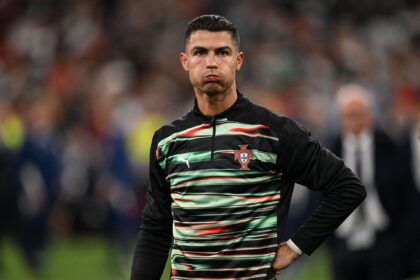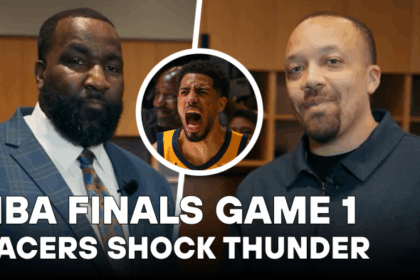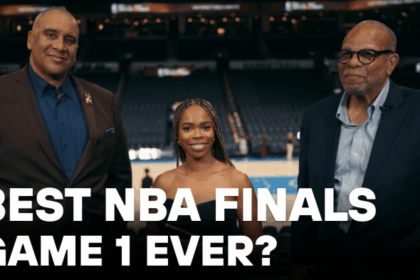The Oklahoma City Thunder have been the best team in the NBA all season. The Thunder now have a chance to write the perfect ending to their season against the the Indiana Pacers in the 2025 NBA Finals.
And in the Pacific Northwest, a fan base may very well be wondering what might have been.
With the Finals here, it is a good time to take a look back and revisit how the Seattle SuperSonics found their way to Oklahoma City, where the Thunder are now on the verge of an NBA title.
As it often does, it starts with an arena.
In 2001, Starbucks CEO Howard Schultz became the new owner of the Sonics, having purchased the team from Barry Ackerley, the owner and CEO of the Ackerley Group, a media company.
Ackerley, before selling the team to Schultz, had been pushing for a renovation to Key Arena, which by that time had become the smallest venue in the NBA, even after a previous remodeling in 1995. He then began looking to sell the franchise, ultimately selling the Sonics to a group of Seattle investors led by Schultz, who had risen to prominence as the CEO of Starbucks. The deal was announced on January 11, 2001. Optimism is high.
Two months later the “dot com” bubble bursts, and recession hits the United States. Many of the co-owners who purchased the Sonics along with Schultz were suddenly feeling a bit of a money pinch.
Still, the early years of the Schultz tenure were solid. The Sonics made the playoffs in the first year of Schultz’s tenure, the 2001-2002 season. They advanced to the Western Conference Semifinals in the 2004-2005 season. They were not the George Karl/Shawn Kemp/Gary Payton teams that were on the cusp of a title, but they were trending up.
But there were tensions simmering below the surface.
We can start with the trade that eventually sent Payton to the Milwaukee Bucks. The star guard was in the final year of his contract and was hoping for an extension so he could stay in Seattle. In his words, however, Schultz “made it seem like ‘I don’t care about you no more, you’re nothing.’”
In April of 2003, Payton was on his way to the Bucks, part of a five-player deal that sent Payton and Desmond Mason to the Bucks in exchange for Ray Allen, Kevin Ollie, and Ronald Murray, as well as a conditional first-round pick.
“[Schultz] just messed up our whole [franchise] and people did leave Seattle alone when he owned the team,” said Payton. “That’s why he had to sell it again, because he was struggling. He made a lot of silly moves and the first silly move was getting rid of me.”
Payton’s quote highlights the other tension that was simmering in Seattle. The team was losing money, and Schultz was hoping to secure public funding from the Washington State Legislature for a new arena. But with the state government hesitant to offer such funds, Schultz started down a different path. In July of 2006, he sold the Seattle Storm, the city’s WNBA franchise, when he could not secure public funding from the City of Seattle for a new arena.
Schultz was looking for local groups to buy the Sonics as well, but eventually agreed to sell the team to a group of Oklahoma City business leaders led by Clay Bennett, a former owner of the San Antonio Spurs. The purchase of the team included a “good-faith effort” to keep the team in Seattle, provided there would be public funding behind a new arena.
Still, local leaders balked.
“This is the biggest waste of money I can imagine,” said Adam Glickman, spokesman for the powerful Service Employees International Union, when Bennett’s leadership group presented lawmakers with plans for a new arena. “The Legislature should stop wasting time and money with this issue and move on to things that matter.”
The money never came, and Bennett’s group stated their next intentions.
Moving the team to Oklahoma City.
Two lawsuits followed, hoping to stop the move to Oklahoma City, even if temporarily. There was a lease in place that required the Sonics to play in KeyArena through 2010, but when Bennett’s group looked to break that agreement, the city sued to enforce the lease. Another lawsuit came from Schultz himself, seeking to rescind the sale of the team. This lawsuit alleged that Bennett’s group engaged in fraud and misrepresentation when they stated a “good-faith effort” would be made to keep the team in Seattle.
“The damages that are being sought is to rescind, unwind the transaction,” said attorney Richard Yarmuth, who represented Schultz in the litigation.
“It’s not money damage. It’s to have the team returned. The theory of the suit is that when the team was sold, the Basketball Club of Seattle, our team here, relied on promises made by Clay Bennett and his ownership that they desired to keep the team in Seattle and intended to make a good-faith effort to accomplish that.”
According to that lawsuit, e-mails among the Oklahoma City ownership group outlined their intent to move the team to Oklahoma City after the sale. One such email included the question “[i]s there any way to move here [Oklahoma City] for next season or are we doomed to have another lame duck season in Seattle?”
Another email had this statement: “[w]e didn’t buy the team to keep it in Seattle; we hoped to come here [Oklahoma City].”
The two lawsuits had varying degrees of success. The lawsuit filed by the City of Seattle ended in a settlement, under which the new ownership group was required to pay $45 million to break the lease, plus an additional $30 million if Seattle had no replacement team after five years.
Schultz’s suit was dropped after it was outlined by the league that the Starbucks owner had signed a binding contract not to sue the new ownership group, as well as the fact that Schultz’s proposal to transfer ownership of the team to a court-appointed receiver would violate NBA league rules.
Always read the fine print, friends.
Ultimately, the move went through. The Sonics moved to Oklahoma City ahead of the 2008-2009 NBA season, and after missing the playoffs that year, the franchise returned to the postseason the following season. The Thunder advanced to the NBA Finals at the end of the 2011-2012 season — where they lost to the Miami Heat — and are now back in the Finals.
But the feelings are still raw in Seattle, as a fanbase remains aggravated by the departure of a beloved organization.
“You can see people walking the sidewalks and streets of Seattle, and even the suburbs,” SuperSonics fan Eric Phan said in a recent interview. “People are wearing Sonics gear like they never really left.”
That sentiment includes former players.
“I’m not rooting,” former Sonic Nate McMillan told TMZ. “But I think they have the better team…What we have to do is get the Sonics back in Seattle. I’m praying, crossing my fingers, all of that.”
“We got our team stolen from us,” Payton said recently. “Plus, if you look at the ‘90s, look what we’ve done. We were one of the premier teams in the NBA. Why wouldn’t you want your team back?”
“A lot of Sonics fans that I know I’m sure never got over the wounds of what happened here 17 years ago with them leaving [for] Oklahoma City,” added Phan. “All of the Sonics fanbase [is] rooting for the Indiana Pacers.”









